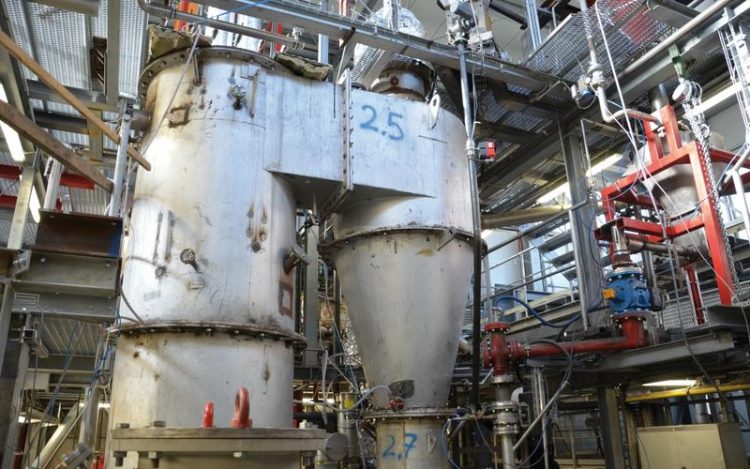Capturing CO2 from power plants with lime

The flue gas is cleaned of CO2 in the Carbonator. There the CO2 reacts with lime to form a solid. (© EST, TU Darmstadt)
The flue gases from coal-fired power plants contain considerable amounts of CO2. This greenhouse gas can be captured. Researchers and industry are testing various methods for this. The BINE-Projektinfo brochure “CO2 capturing using lime” (01/2014) presents the “carbonate looping” method.
Here, CO2 is bound by lime in coal-fired power plants and then separated again using heat, whereby it costs 15 euros to capture one tonne of CO2. This value is well below the cost of other retrofittable capturing processes.
During the first sub-process, lime binds the CO2 in a fluidised bed reactor. This frees a large amount of heat, which is then available for the power plant process.
The CO2-free flue gas is then released into the atmosphere. In the second sub-process, the CO2 bound in the resulting calcium carbonate is separated in a pure oxygen atmosphere by supplying heat, and can then be recycled or stored geologically.
The strengths of carbonate looping include the low costs with a 90% capture rate. This is due to the lower efficiency losses in comparison with other methods. Existing power plants can be retrofitted with carbonate looping.
The research project, which is being coordinated by the Department of Energy Systems and Technology (EST) at the Technische Universität Darmstadt, is being jointly conducted with industrial partners.
The researchers are currently testing the method on a 1-megawatt demonstration plant. During the next few years they will be in particular testing the behaviour with rapid load changes.
The BINE-projectinfobrochure, which can be obtained free of charge from the BINE Information Service at FIZ Karlsruhe, is available online at www.bine.info or by calling +49 (0)228 92379-0.
Press contact
Uwe Milles
presse(at)bine.info
About BINE Information Service
Energy research for practical applications
The BINE Information Service reports on energy research topics, such as new materials, systems and components, as well as innovative concepts and methods. The knowledge gained is incorporated into the implementation of new technologies in practice, because first-rate information provides a basis for pioneering decisions, whether in the planning of energy-optimised buildings, increasing the efficiency of industrial processes, or integrating renewable energy sources into existing systems.
About FIZ Karlsruhe
FIZ Karlsruhe – Leibniz Institute for Information Infrastructure is a not-for-profit organization with the public mission to make sci-tech information from all over the world publicly available and to provide related services in order to support the national and international transfer of knowledge and the promotion of innovation.
Our business areas:
• STN International – the world’s leading online service for research and patent information in science and technology
• KnowEsis – innovative eScience solutions to support the process of research in all its stages, and throughout all scientific disciplines
• Databases and Information Services – Databases and science portals in mathematics, computer science, crystallography, chemistry, and energy technology
FIZ Karlsruhe is a member of the Leibniz Association (WGL) which consists of 87 German research and infrastructure institutions.
http://www.bine.info/en/press/press-releases/press/pressemitteilung/co2-aus-kraf… – Download cover, press release and info-pdf
http://www.bine.info/en – BINE Informationsdienst english
Media Contact
All latest news from the category: Ecology, The Environment and Conservation
This complex theme deals primarily with interactions between organisms and the environmental factors that impact them, but to a greater extent between individual inanimate environmental factors.
innovations-report offers informative reports and articles on topics such as climate protection, landscape conservation, ecological systems, wildlife and nature parks and ecosystem efficiency and balance.
Newest articles

Long-sought structure of powerful anticancer natural product
…solved by integrated approach. A collaborative effort by the research groups of Professor Haruhiko Fuwa from Chuo University and Professor Masashi Tsuda from Kochi University has culminated in the structure…

Making a difference: Efficient water harvesting from air possible
Copolymer solution uses water-loving differential to induce desorption at lower temperatures. Harvesting water from the air and decreasing humidity are crucial to realizing a more comfortable life for humanity. Water-adsorption…

In major materials breakthrough
UVA team solves a nearly 200-year-old challenge in polymers. UVA researchers defy materials science rules with molecules that release stored length to decouple stiffness and stretchability. Researchers at the University…



